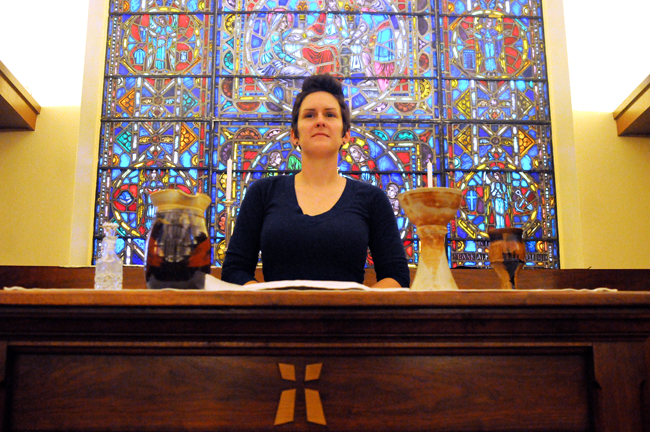After years of work to receive ordination, Mary Ann Kaiser will have to wait months or even years for religious authorities to decide if she can become a minister as an openly gay woman.
Kaiser, a youth director and justice associate at University United Methodist Church on Guadalupe and 24th streets, was removed in June from enrollment in her church’s ordination process by religious authorities overseeing the church because of her sexuality. James Dorff, a Bishop of the Southwest Texas Conference that oversees Kaiser’s church, rejected an appeal by Kaiser’s pastor this month.
Dorff said it was not in his authority to challenge a decision by the Board of Ordained Ministry, the body that removed Kaiser from enrollment. He was given 30 days to review the matter.
“I was disappointed,” Kaiser said. “I would have rather had a ruling against me than a non-ruling, as it would have at least held some conviction.”
Dorff cited the United Methodist Church’s book of rules in his ruling, which states “homosexuality is incompatible with Christian teaching” and that a “self-avowed practicing homosexual” cannot be ordained.
“I understand that he’s trying to be a pastor and a leader to the whole community, which holds a variety of opinions,” Kaiser said. “But it’s hard to hear nothing of substance as a response to this important and very timely issue of justice.”
Kaiser’s case, which was approved by the District Committee of Ordained Ministry for ordination in April after seven years of preparation, will now head to the October meeting of the United Methodist Church’s Judicial Council.
The council is made up of members elected from churches nationwide and could uphold Dorff’s decision or require him to conduct further review.
Kaiser said the decision indicated a lack of transparency and accountability about the operations of the Board of Ordained Ministry, and that it was frustrating that Dorff would avoid a ruling on the basis of a technicality without taking a stance on gay clergy.
The board did not interview Kaiser before making their decision, a usual requirement before they choose to deny ordination.
“This is a serious lingering question for me,” Kaiser said. “There seems to be a level of unbridled authority functioning that should concern Methodists of all varieties.”
Joy Butler, chair of the Southwest Texas Conference’s Reconciling Team, called Dorff’s decision unfair.
“I believe that being biblically obedient means that orientation and gender identity should not be a barrier to following a call to be a leader in Church,” Butler said. “Jesus taught us to love all, and many of his followers included those who were denied a voice and excluded from society.”
Butler, who started a letter-writing campaign directed at Dorff during the 30-day period with the support of the Reconciling Ministries Network, said many United Methodists who are not socially progressive recognize the unfairness in the board’s decision to deny Kaiser an interview, which is outlined as part of the ordination review in the denomination’s rule book.
“United Methodists are wondering why the Board is stepping out of line from protocol and refusing to fully review her ordination path,” Butler said.
Butler said she hopes the Judicial Council ruling will provide some clarity.
Kaiser said she is moved by the outpouring support for her and a more inclusive church, but also said she has lately become disillusioned by the church’s policies.
“I wonder how long my denomination will continue to pretend our policies of discrimination don’t contribute to a culture which greatly harms LGBTQ folks, and all in the name of God,” Kaiser said. “Of course the Bishop cannot change this policy, but I do wish leaders would start making a public witness against this in the South as they have been doing in the North.”
Kaiser will have to wait until 2016 for a new decision if a ruling is not made in October, when the United Methodist General Conference meets to discuss church policy.





















